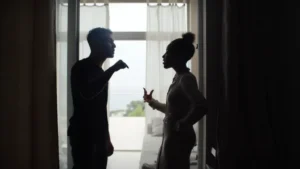My path began at 16, when life threw a curveball. My father left for Europe, abandoning us as my mother battled illness. As the eldest, I took responsibility, diving into the nearest job at a hair salon. Starting with mundane tasks like washing hair and sweeping, I climbed the ladder through sheer determination.

My skills flourished, and I carved a niche among the elite, becoming a sought-after hairstylist. Amidst this, I met Stan at a music festival, a sharp contrast to my world with his Yale law background. Despite my achievements, Stan sometimes overlooks the intelligence my career demands. It’s been a ride of passion, hard work, and love, mingling contrasting worlds in search of mutual respect.
Reflecting on our journey, I’ve noticed a pattern of subtle disparagements from him, especially concerning my education and career as a hairstylist. These moments have gradually built up, creating an undercurrent of tension between us.

Our relationship, which started with so much promise and understanding, began to reveal cracks as Stan’s casual jokes about my job became a recurring theme. At first, I brushed them off, attributing them to his sense of humor. However, over time, these comments felt less like jokes and more like veiled criticisms.
He would often compare our educational paths, highlighting his Ivy League background while downplaying my self-made success. In social settings, I noticed his reluctance to discuss my career, as if it was a topic unworthy of conversation among his academic peers.
Our engagement began to weigh on me. The ring he gave me reminded me of the wealth he had and the education that helped him earn so much. Was I really just a mere hairdresser?
This growing tension culminated in a dinner that I can only describe as the straw that broke the camel’s back. We were dining with a group of Stan’s friends from law school, a setting where I already felt the unspoken judgment of being the only non-academic in the room. The evening was progressing with typical conversations about legal theories and case studies, subjects far removed from my daily experiences but interesting nonetheless.

The turning point came when one of Stan’s friends, perhaps in an effort to include me in the conversation, asked for my perspective on a current event. Before I could even formulate a response, Stan interjected with a dismissive, “Don’t bother asking her; she’s just a hairdresser. She doesn’t care about this kind of thing, right, honey?” His words, sharp and belittling, echoed around the table, meeting a mix of awkward silences and forced chuckles.

I was stunned, not just by the public humiliation, but by the realization that the man I loved saw me as less than. My face flushed with embarrassment and anger, yet I chose to hold my composure. In a quiet, sarcastic retort, I said, “Okay, thanks, Stan, I’m so glad you made sure I didn’t embarrass you.” The rest of the evening, I remained silent, my mind racing with thoughts and emotions.
Reflecting on that night, I recognize it as a pivotal moment in our relationship. It was a wake-up call, highlighting the deep-seated issues we needed to address. Stan’s comment was not just about that dinner; it symbolized his underlying attitude towards my profession and, by extension, towards me. It made me question our compatibility and whether mutual respect could ever be the foundation of our relationship.

Since that dinner, I’ve been contemplating our future together. It’s clear that for our relationship to thrive, or even survive, we need to have some serious conversations about respect, understanding, and appreciation of each other’s paths and contributions. That evening’s events have ignited a stronger sense of self-worth in me and a determination to demand the respect I deserve, not just from Stan, but from everyone in my life.
After the dinner debacle, a fire was lit within me. The next day at work, while styling a client’s hair, an idea began to form. I was determined to make Stan realize the value of my profession and regret his belittling remarks.
During my break, I reached out to my clients, explaining my plan and asking for their help. To my delight, they all agreed, eager to support me. The majority of women whose hair I styled had been belittled by men at some point in their lives, so they were glad to bite back. I organized a dinner, not just any dinner, but one that would unveil the true extent of my professional world to Stan.
I called Stan, playing it cool, as if everything was back to normal. He seemed relieved, thinking I had calmed down from our last encounter. I invited him to dinner, hinting it was a casual gathering with “some of my friends.” He readily accepted, unaware of what awaited him.
That evening, I welcomed Stan into a room filled with my clients: successful entrepreneurs, renowned artists, and influential figures, all of whom I had met through my salon. As the night unfolded, Stan was visibly impressed and increasingly uneasy. Conversations around us highlighted not just the artistry of hairstyling but also its impact on networking and business in the high-profile circles.
Each story shared by my clients subtly underscored the intellect and sophistication required in my line of work, challenging Stan’s preconceived notions. The highlight of the evening was when a well-known business mogul publicly thanked me for my creativity and professionalism, attributing part of his social success to the confidence my work instilled in him.
Stan was taken aback to discover that Mrs. Williams, his boss, was among my clients. “Honey, how do you know Mrs. Williams? She’s my boss. I have to introduce myself; this could be the chance for a promotion,” he suddenly said. I put my arm around Stan and led him straight up to a group of women, including his boss.

“Hello ladies, I’ve been eager to introduce you to my fiancé. Meet Stan. Please be gentle with him; he’s an assistant and tends to get a bit anxious around influential women, right, sweetheart?” I said sweetly.
Stan looked shocked and terrified. “No, no, I am a Yale Law graduate, I’ve worked in your firm for two years and am aiming to become a junior partner soon, and I—” he faltered, and the women gave him an indulgent smile, as if he were a boasting child, before continuing their conversation.
Stan got furious. He took me aside. “How could you do this to me?” he snapped. “I looked like a fool, thanks to you, and felt so embarrassed.”
“Hurts, huh? I just showed you the same treatment you gave me at dinner with your friends. These people are my friends and listen to what I say,” I told him confidently.
The women, my clients, and friends, responded with indulgent smiles, treating him with a benign condescension that mirrored the way he had previously diminished my career. This reversal of roles left Stan flustered and, later, furious. He confronted me, feeling humiliated and exposed.

I calmly explained that this was the mirror image of what I experienced at the dinner with his friends. It was a lesson in empathy, a way for him to understand the impact of his words and actions. I made it clear that my intent was not to belittle but to illuminate the respect and acknowledgment everyone deserves, regardless of their profession.
When Stan called me a couple of days later to apologize tearfully, I was rather cold-hearted. I knew he had the best intentions at heart; however, I couldn’t fathom building a future with a man who had thought so little of me for so long. After some thinking, I handed him the diamond ring he had given me. We could start anew, but I was going to rethink our engagement.










